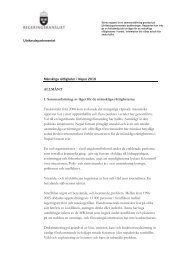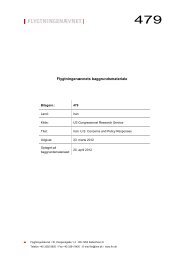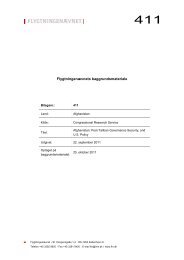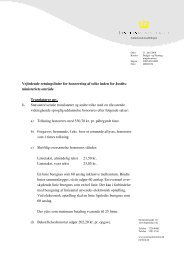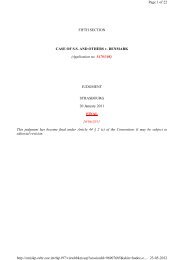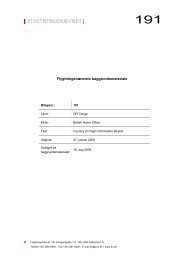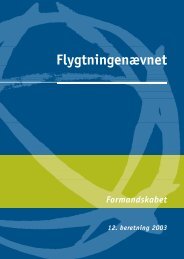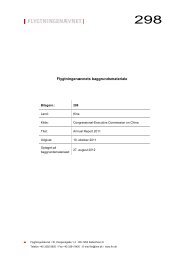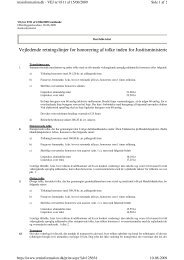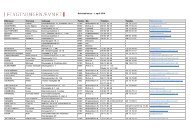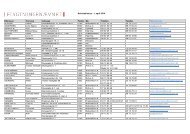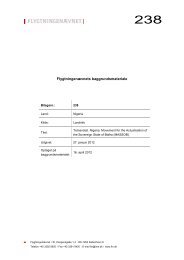Annual Report - National Human Rights Commission
Annual Report - National Human Rights Commission
Annual Report - National Human Rights Commission
Create successful ePaper yourself
Turn your PDF publications into a flip-book with our unique Google optimized e-Paper software.
Annexure 12<br />
○ ○ ○ ○ ○ ○ ○ ○ ○ ○ ○ ○ ○ ○ ○ ○ ○ ○ ○ ○ ○ ○ ○ ○ ○ ○ ○ ○ ○ ○ ○ ○ ○ ○ ○ ○ ○ ○ ○ ○ ○ ○ ○ ○ ○ ○ ○ ○ ○ ○ ○ ○ ○ ○ ○ ○ ○ ○ ○ ○ ○ ○<br />
○<br />
NGOs, CBOs, religious teachers, mediapersons and all members of the community. We need to<br />
build up a community culture to ensure that trafficking is not just condemned, but not tolerated<br />
at all.<br />
Community Policing<br />
Several initiatives have been taken by many police officers across the country by involving<br />
NGOs to act as bridges between the police and the public. Such initiatives of community policing<br />
are essential for combating trafficking. This not only brings in the involvement of the community,<br />
but also facilitates the functioning of the police. Community cooperation is essential for getting<br />
independent witnesses for rescue operations. Rescued persons can be lodged in the ‘homes’ run<br />
by NGOs. Certain innovative examples of community–police partnership do exist like the crossborder<br />
committees in certain districts on the Indo-Nepal border. The JIT programme, set up by<br />
the UN agencies, is another example. However, such initiatives have to spread to other places<br />
and the existing ones need to be institutionalised. In order to prevent cross-border trafficking,<br />
law enforcement agencies like BSF and SSB could look at developing police–pubic networks,<br />
especially in the vulnerable areas, and utilise them for acting as watchdogs and informants on<br />
traffickers and exploiters and thus, help in the prevention of trafficking.<br />
Combating Sex Tourism<br />
Law enforcement agencies and civil society need to take special efforts in this direction. Urgent<br />
steps have to be taken by the government to arrest the menace of sex tourism. It cannot be<br />
hidden under the carpet any longer. Coordination among the state police agencies and central<br />
law enforcement agencies, including immigration authorities, as well as other related departments<br />
like tourism and urban development, etc. has institutionalized. The provisions of the Goa<br />
Children’s Act, 2003 could be a model for other states to bring in such provisions and ensure<br />
their implementation. There is a need for extra-territorial legislation on the subject. Moreover,<br />
preventive steps should include wide dissemination of the legal provisions and preventive<br />
strategies, by involving tourism departments, corporates, hoteliers, tour operators, and other<br />
stakeholders. Tourism promotion cannot be at the expense of women and children. Protection of<br />
child rights and women’s rights should form the core of tourism promotion initiatives, policies<br />
and programmes.<br />
Addressing Culturally Sanctioned Practices<br />
Since several cultural practices provide the substratum for trafficking and commercial sexual<br />
exploitation of women and children, it is essential to initiate special efforts to address these<br />
issues in places where such practices exist. While the Devadasi (Prohibition of Dedication) Act,<br />
1982 of Karnataka addresses the issue per se; the Goa Children’s Act, 2003 addresses the issue<br />
of trafficking linked to culturally sanctioned practices. Effective implementation of these social<br />
legislations calls for synergy between law enforcement agencies, other governmental institutions<br />
like NCW, and civil society. NGOs have a large role to play in building up public awareness and<br />
breaking the silence of the community. There is a need to promote zero tolerance to this kind of<br />
278<br />
<strong>National</strong> <strong>Human</strong> <strong>Rights</strong> <strong>Commission</strong> <strong>Annual</strong> <strong>Report</strong> - 2004-2005<br />
AR-Chapter-1-19-10-6-06.p65<br />
298<br />
7/17/06, 6:31 PM



